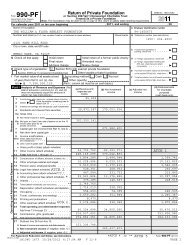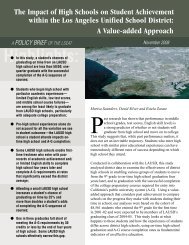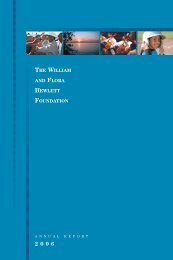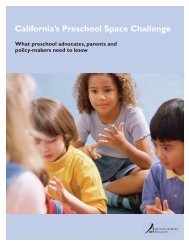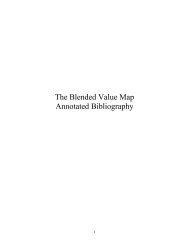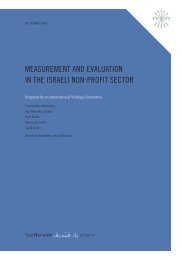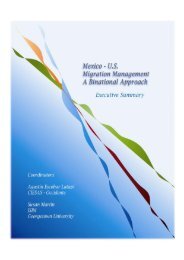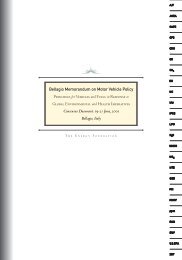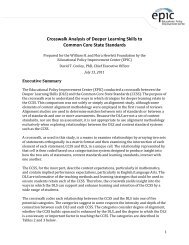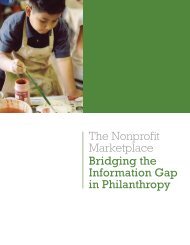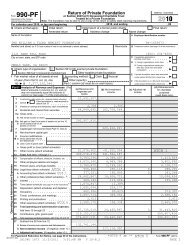EDUCATION FOR LIFE AND WORK - Hewlett Foundation
EDUCATION FOR LIFE AND WORK - Hewlett Foundation
EDUCATION FOR LIFE AND WORK - Hewlett Foundation
Create successful ePaper yourself
Turn your PDF publications into a flip-book with our unique Google optimized e-Paper software.
Education for Life and Work: Developing Transferable Knowledge and Skills in the 21st Century<br />
24 <strong>EDUCATION</strong> <strong>FOR</strong> <strong>LIFE</strong> <strong>AND</strong> <strong>WORK</strong><br />
This growing body of evidence showing that dimensions of intelligence<br />
are malleable has important implications for teaching and learning. Recent<br />
research on interventions designed to increase motivation has found that a<br />
learner who views intelligence as changeable through effort is more likely<br />
to exert effort in studying (Yaeger and Walton, 2011; see further discussion<br />
in Chapter 4).<br />
In the intrapersonal and interpersonal domains, Roberts, Walton, and<br />
Viechtbauer (2006) found that both the intrapersonal competency of conscientiousness<br />
(sometimes called self-direction or self-management in lists of<br />
21st century skills) and the interpersonal competency of social assertiveness<br />
increase with age. Srivastava et al. (2003) analyzed data from the “big five”<br />
personality inventories completed by a large sample of over 130,000 adults,<br />
finding that both conscientiousness and the interpersonal skill of agreeableness<br />
increased throughout early and middle adulthood. The authors also<br />
found that neuroticism declined with age among women, but not among<br />
men. Reflecting on these various patterns of change, Srivastava et al. (2003)<br />
concluded that personality traits are complex and subject to a variety of<br />
developmental influences.<br />
In contrast to the prevailing view of personality traits as fixed, some<br />
researchers have argued that individual human behavior demonstrates no<br />
consistent patterns and instead changes continually in response to various<br />
situations (e.g., Mischel, 1968). Based on a review of the research related<br />
to both points of view, Almlund and colleagues concluded that “although<br />
personality traits are not merely situation-driven ephemera, they are also<br />
not set in stone,” and suggested that these traits can be altered by experience,<br />
education, parental investments, and targeted interventions (Almlund<br />
et al., 2011, p. 9). They proposed that interventions to change personality<br />
are promising avenues for reducing poverty and educational disadvantage.<br />
With this view of malleability in mind, the committee reviewed lists of<br />
21st century skills included in eight recent reports and papers (see Appendix<br />
B). We selected reports and papers for review if they built on, synthesized,<br />
or analyzed previous work on 21st century skills. For example, we included<br />
a report that reviewed 59 international papers on 21st century skills and<br />
found that the skills most frequently referred to were collaboration, communication,<br />
information and communications technology (ICT) literacy,<br />
and social or cultural competencies (Voogt and Pareja Roblin, 2010). We<br />
selected a white paper commissioned by the Assessment and Teaching of<br />
21st Century Skills project that synthesized many previous lists of 21st<br />
century skills and organized them into a taxonomy of skills (Binkley et al.,<br />
2010). We also included a document from the <strong>Hewlett</strong> <strong>Foundation</strong> that<br />
lists 15 skills based on previous research by the OECD (Ananiadou and<br />
Claro, 2009). In addition, we included papers commissioned by the NRC<br />
to more clearly define 21st century skills (e.g., Finegold and Notabartolo,<br />
Copyright © National Academy of Sciences. All rights reserved.




